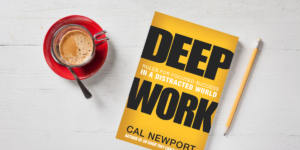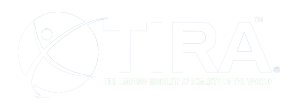Could Embracing Deep Work Make You a Better Leader?
By Aideen Hopkins
Anyone who knows me knows I love to be busy, to make sure things are getting done and to be prepared for the next challenge or opportunity. I am also someone who understands the value of continued growth and learning. As a leader and a company owner, the better I can perform, the better off my organisation and employees will be. Given my fondness for operational productivity, I am always on the lookout for new ways to improve output, whether that is the company’s or my own. I do often find myself picking up small changes or habits that might be helpful, but it isn’t often that I find myself resonating so strongly with a methodology that could significantly reshape the way I work and have important ripple benefits for those around me; which I found in ‘Deep Work: Rules for Focused Success in a Distracted World’ by Cal Newport.

What is Deep Work?
Deep Work is a concept and terminology coined by author and professor Cal Newport. It refers to the ability to “focus without distraction on a cognitively demanding task” and when properly implemented it should “allow you to quickly master complicated information and produce better results in less time”. With so many distractions and the constant demands of more ‘shallow’ work surrounding us, especially as leaders, it becomes harder and harder for us to carve out specific time to accomplish deep work and reap its benefits. Finding the space and time, separate from constant interruptions, might sound like a lofty pipe dream for most professionals, but forcing ‘deep work’ periods into our schedule is like adding a “superpower” that could transform our productivity and produce extraordinary results. Newport uses his book as a comprehensive guide to anyone seeking better focus and having outlined the benefits to cultivating a deep work ethic, he presents a training regimen of how to adapt to a deep work future and the four crucial ‘rules’ to follow.
The Four Rules
- Find the time. Deep work, when done successfully, is a highly successful way to optimise your performance and to force you to focus on the tasks that are actually most important. As leaders we face untold demands on our time, that if not managed correctly, can negatively impact our ability to strategise, implement and create. While less vital aspects of our roles, or as Newport terms it ‘shallow work’, is still important (and can often require swift action in order to prevent other company performance bottlenecks) our overall functionality will be improved if we schedule time for both shallow and deep work during our week. A key facilitator to finding the time is to make sure you have the right team to rely on. I am so lucky to have such a trusted and high-performing management team at EER with Andrea Unser as Director of Strategy and Transformation, Dimple Torralba as Corporate Services Team Leader, Kelly Labuschange as Immigration Team Leader and Janice Trinidad as our Relocation Team Leader. Knowing I can leave more of the day-to-day responsibilities in their capable hands has allowed me to restructure the way I work, have more time for ‘deep work’ and focus on the set up of our brand new KSA office.
- Embrace boredom. We might find it difficult to entertain a concept that feels a little wasteful, but there is value to be drawn from the moments we aren’t preoccupied with work or the latest Netflix show. When we allow our minds to wander during less engaging periods we can encounter the unconscious thought theory, whereby an answer or relevant thought regarding a topic we have been dealing with may come to us in a flash of inspiration and spark unforeseen results. For me, I find that switching off my concentrated focus when walking the dog or swimming often means that ideas come to me more organically and suddenly I can see our strategy or governance framework in a new light.
- Quit social media. Yes, he does mean all of it. Now, I am aware of the irony of this, likely as it is that you have been brought here via one of our social media platforms on Facebook, Linkedin or Twitter, but he makes a very valid point. Social media and online sites can be very unnecessary distractions, where we can get lost scrolling and the hours just disappear. If that sounds at all familiar, then your usage definitely needs an overhaul (though a cold turkey cut off may be a little tough to take).
- Drain the shallow. As I mentioned above the ‘shallow work’ that Newport refers to can still be very pivotal to how your business operates, but it may also not be best served by you handling it. Perhaps some delegation is in order to attribute tasks to those better suited? When I interview candidates, I tell them I am looking to be made redundant and by surrounding myself with a trusted team and having the right succession plan in place, I can delegate more and focus on the vital tasks that require the ‘deep work’ approach. I am the first to admit that loosening the reigns can be a challenge, but you will be infinitely better off for it. By using delegation and swift action scheduling, you can ‘drain the shallow’ and increase your productivity as well as your downtime – which is just as important. Being able to switch off allows us to rejuvenate, which can make us better leaders in the short-term and long-term.
There is no doubt that valuable lessons can be drawn from this concept of delineating between deep work and shallow work, especially when it comes to increasing focus and reducing distractions in order to be more productive and healthier. I have found many aspects of the book incredibly compelling, especially when it comes to honing my leadership skills, but I am still a work in progress………… It actually took me six weeks to finish the book, which shows how poorly I am currently managing my distractions, and I am very unlikely to give up my Daily Mail guilty pleasure viewing anytime soon. That said, I realise how costly some distractions can be and how valuable deep work could be, especially when used to achieve essential goals and paired with a ‘cadence of accountability’. So, while I may keep my de-stress gossip catch-up, I will be focusing on how to make ‘deep work’ a lasting part of my routine.





